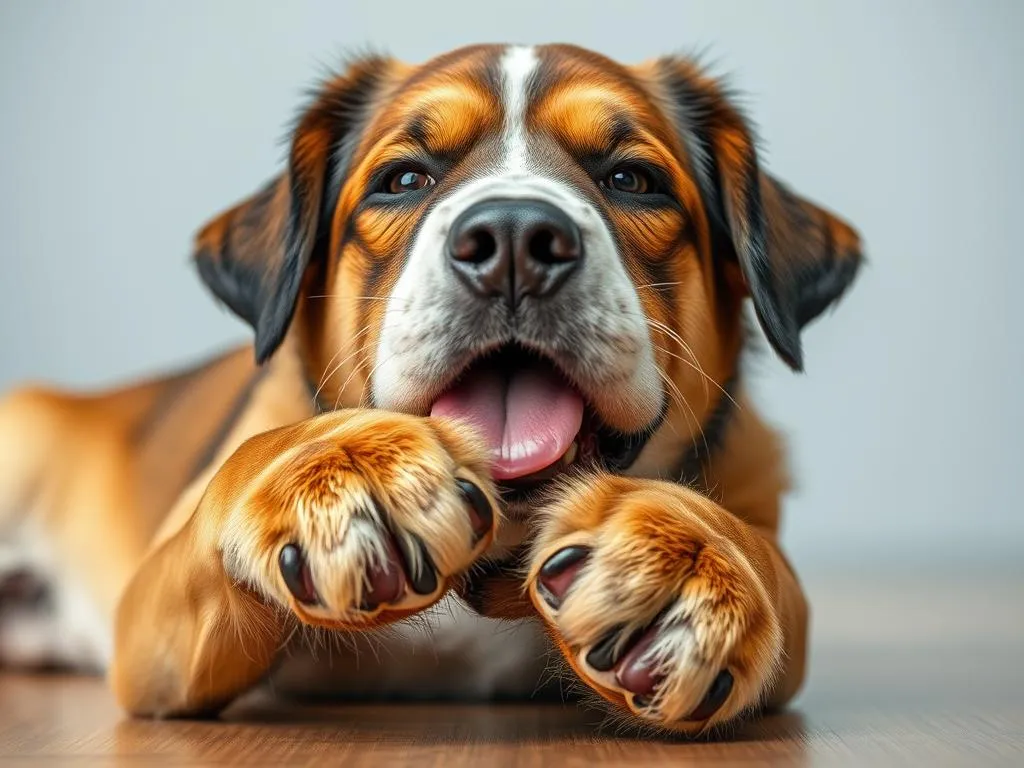
Introduction
Maintaining optimal dog health care is crucial for ensuring that our furry companions lead happy, healthy lives. As pet owners, we often find ourselves puzzled by certain behaviors exhibited by our dogs. One such behavior that raises concern is paw chewing. This article aims to delve into the reasons behind this behavior and provide insights on how to address it effectively.
When dogs chew their paws, it can be alarming for pet owners. Understanding the root cause of this behavior is essential for proper care and intervention. In this comprehensive guide, we will explore the various reasons why dogs chew their paws and discuss effective strategies for addressing this issue.
Understanding Dog Behavior
Natural Behaviors in Dogs
Dogs are inherently curious creatures with natural instincts that influence their behavior. Chewing is one of these natural behaviors. From a young age, puppies explore their environment with their mouths, and this instinct often continues into adulthood. Chewing not only serves as a method of exploration, but it also provides comfort and relief for dogs.
Common Reasons for Chewing
While chewing is normal, it can sometimes become a problematic behavior. Dogs may chew on a variety of objects, including toys, furniture, and, notably, their own paws. Understanding why dogs engage in this behavior can help owners find solutions to mitigate it.
Why Do Dogs Chew Their Paws?
Allergies and Irritation
One of the most common reasons dogs chew their paws is due to allergies. Environmental allergens such as pollen, grass, and dust mites can irritate a dog’s skin, leading to excessive licking and chewing. If your dog seems to be chewing more frequently during certain seasons, it may be experiencing environmental allergies.
Food allergies are another potential culprit. Dogs can develop sensitivities to specific ingredients in their diet, resulting in skin irritations and discomfort. Symptoms might include itchy skin, redness, and inflammation, prompting dogs to chew on their paws in an effort to relieve the irritation.
Skin Conditions
In addition to allergies, various skin conditions can lead dogs to chew their paws. Common issues include fungal infections, bacterial infections, and hot spots. These conditions often cause itching, pain, and inflammation, prompting dogs to lick and chew their paws for relief.
Pet owners should be vigilant for signs of skin problems, such as redness, swelling, or unusual odors, which may indicate an underlying issue that needs addressing.
Anxiety and Stress
Dogs can experience anxiety and stress just like humans. This emotional discomfort can manifest in various ways, including chewing on their paws. Situational stressors, such as changes in routine, loud noises, or the arrival of new pets or people, can trigger anxiety in dogs.
When dogs feel anxious, they may resort to self-soothing behaviors like paw chewing. If you notice your dog chewing their paws more during stressful situations, it’s crucial to identify the cause of their anxiety and work on reducing it.
Boredom and Lack of Stimulation
Just as humans need mental and physical stimulation, dogs do too. A lack of engagement can lead to boredom, prompting dogs to resort to destructive behaviors, including chewing on their paws. Without proper exercise and mental challenges, dogs may turn to their own bodies for entertainment.
To prevent boredom-related chewing, it’s essential to provide dogs with regular physical activity and mental stimulation in the form of interactive toys, puzzles, and playtime.
Pain or Discomfort
Sometimes, dogs chew their paws because they are experiencing pain or discomfort. Injuries, such as cuts, scrapes, or thorn punctures, can lead dogs to lick and chew at their paws in an attempt to soothe the pain. Additionally, conditions like arthritis or other joint issues may cause discomfort that leads to chewing.
Pet owners should observe their dogs for any signs of injury or discomfort, including limping, favoring a paw, or excessive licking in a specific area.
Diagnosing the Cause of Paw Chewing
Observational Techniques
To effectively address the issue of paw chewing, owners should begin by observing their dog’s behavior. Keep a record of when and where the chewing occurs, noting any potential triggers. Is it more frequent during certain times of day or after specific activities? Monitoring the frequency and duration of chewing can help identify underlying causes.
Veterinary Consultation
If paw chewing persists or worsens, it is essential to consult a veterinarian. A professional can conduct a thorough examination and may recommend diagnostic tests, such as allergy tests or skin scrapings, to determine the underlying cause of the behavior. Early intervention is key to preventing further complications and ensuring your dog’s well-being.
Treatment Options
Addressing Allergies
If allergies are determined to be the cause of your dog’s paw chewing, the first step is to identify the allergen. For environmental allergies, your veterinarian may recommend medications such as antihistamines or corticosteroids to manage symptoms. In cases of food allergies, transitioning to a hypoallergenic diet may be necessary.
Monitoring your dog’s environment and minimizing exposure to allergens can also help alleviate symptoms and reduce the urge to chew.
Managing Skin Conditions
For dogs with skin conditions, treatment will depend on the specific issue. Common treatments may include topical ointments, medicated shampoos, or oral medications to address infections or inflammation. It is vital to follow your veterinarian’s recommendations and ensure follow-up care to monitor the condition.
Behavioral Modifications
If anxiety or boredom is the underlying cause of paw chewing, implementing behavioral modifications can be beneficial. Techniques such as training and desensitization can help reduce anxiety and improve coping skills. Providing interactive toys and engaging in regular playtime can keep your dog mentally stimulated and reduce the likelihood of destructive behaviors.
Pain Management
For dogs experiencing pain or discomfort, pain management is crucial. Your veterinarian may prescribe medications or recommend topical treatments to alleviate pain. Ensuring that your dog has a safe and comfortable environment can also aid in their recovery and discourage chewing.
Prevention Strategies
Regular Check-ups
Routine veterinary visits are essential for early detection of potential health issues. Regular check-ups allow for monitoring of your dog’s overall health and can help catch any developing conditions before they worsen. Keeping up with vaccinations and preventive care, such as flea and tick treatments, is also crucial for maintaining your dog’s well-being.
Proper Nutrition
A balanced diet plays a significant role in your dog’s skin health. Providing high-quality dog food that meets your dog’s nutritional needs can help prevent food-related issues. Consult your veterinarian for recommendations on dog food brands known for their quality and nutritional value.
Environmental Enrichment
To keep your dog mentally and physically stimulated, consider incorporating various enrichment activities into their routine. Activities such as agility training, interactive games, and regular socialization with other dogs can help prevent boredom and destructive behaviors. Engaging in these activities not only benefits your dog’s mental health but also strengthens the bond between you and your furry friend.
Conclusion
Understanding why dogs chew their paws is vital for maintaining their health and happiness. By recognizing the signs and potential causes, pet owners can take proactive steps to address the issue. Whether it’s allergies, skin conditions, anxiety, boredom, or pain, early intervention and appropriate care can make all the difference.
Being observant and proactive in your dog’s health care is key. If you notice that your dog’s paw chewing persists or worsens, consulting a veterinarian is crucial for determining the best course of action. Your dog deserves the best care, and understanding their behaviors is a significant step in ensuring their well-being.









